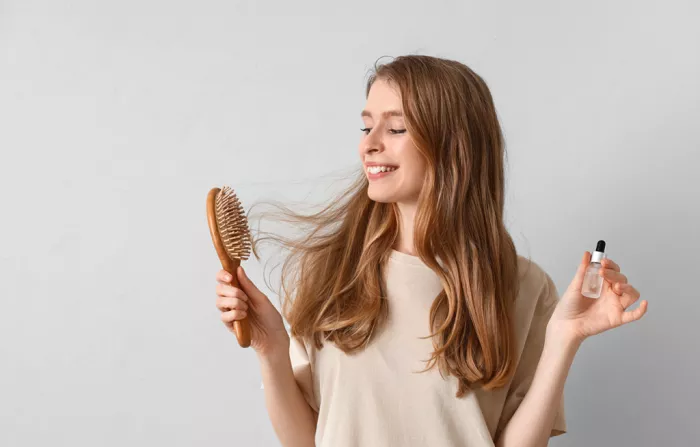Essential oils have become a staple in wellness and beauty circles, widely promoted for their supposed ability to stimulate hair growth. Social media is brimming with DIY blends, before-and-after photos, and anecdotal success stories using rosemary, lavender, and peppermint oils. But how much of this is backed by dermatological science?
To separate fact from fiction, India Today consulted Dr. Vikram Lahoria, Consultant Dermatologist and Medical Advisor at Ceuticoz. He explained the real potential of essential oils, their place in a scientifically sound haircare routine, and why hair health advice should be based on more than just internet trends.
Can Essential Oils Really Boost Hair Growth?
Essential oils have been part of traditional remedies for centuries, and while they do contain active compounds like anti-inflammatory agents and vasodilators, their ability to promote hair regrowth isn’t conclusive.
“Most claims around hair regrowth are anecdotal or based on limited studies,” said Dr. Lahoria. Oils such as rosemary and peppermint have shown some promise, but they don’t rival established treatments like minoxidil or finasteride. “They are best used as adjuncts—not as primary therapies,” he noted.
Which Essential Oils Have Scientific Support?
While research is still emerging, a few essential oils stand out:
Rosemary Oil: A 2015 study found it comparable to 2% minoxidil in reducing hair fall over six months. It may support follicle health by inhibiting 5-alpha-reductase.
Peppermint Oil: Animal studies show it enhances follicle depth and dermal thickness through menthol’s vasodilation.
Lavender Oil: Preclinical models suggest anti-inflammatory effects and improved follicular support.
Tea Tree Oil: Effective for treating dandruff and scalp inflammation that can lead to hair loss.
Cedarwood Oil: Shows promise when used in combination for conditions like alopecia areata.
Still, Dr. Lahoria cautioned, “These findings are preliminary. We need more controlled, large-scale trials to validate their effects.”
Rosemary Oil vs. Minoxidil: Is It a Fair Comparison?
Online buzz often hails rosemary oil as a natural alternative to minoxidil, but that’s an oversimplification. “Minoxidil has decades of robust research. Rosemary oil showed similar results in one small trial, but it’s not as predictable,” said Dr. Lahoria.
Minoxidil actively prolongs the hair growth (anagen) phase and enlarges hair follicles, whereas rosemary oil primarily improves scalp circulation and mildly affects enzyme activity. Moreover, minoxidil is a regulated pharmaceutical, while essential oil quality can vary significantly—especially in homemade versions.
Can You Apply Essential Oils Directly to Your Scalp?
“No, essential oils should never be used undiluted,” warned Dr. Lahoria. These concentrated substances can cause:
Irritant dermatitis
Allergic reactions
Phototoxicity (especially from citrus oils)
Folliculitis
Even systemic toxicity in extreme cases
Essential oils must be diluted to 1–3% in a suitable carrier oil, and patch testing is highly recommended before widespread use.
Common Myths About Essential Oils in Hair Care
Dr. Lahoria outlined several misconceptions:
“They regrow hair like drugs.” False—most oils may assist in early cases but aren’t effective for severe or hormonal hair loss.
“More oil means better results.” Overuse can cause irritation or worsen hair conditions.
“Natural means safe.” Essential oils are potent and can damage the scalp if misused.
“All oils are good for hair.” Not true—some oils are too harsh or pore-clogging.
“Results are immediate.” Hair growth takes time; visible changes may take months of consistent, proper use.
How Do Essential Oils Compare to Medical Treatments?
Essential oils support scalp health, not hair regrowth in medically significant cases. “They complement, but don’t replace, treatments like minoxidil, PRP, or corticosteroids,” explained Dr. Lahoria. For example:
Minoxidil directly stimulates growth.
Steroids reduce inflammation in autoimmune-related hair loss.
Essential oils enhance scalp conditions, which may help hair health but don’t address deeper causes.
The Role of Carrier Oils
Often overlooked, carrier oils enhance absorption and protect the scalp. They also:
Reinforce the skin’s lipid barrier
Reduce the risk of irritation
Match different scalp types (e.g., jojoba for oily scalps, argan for dry)
Choosing the right carrier oil is essential for safe and effective application.
Should Everyone Use Essential Oils?
Not necessarily. “Haircare must be personalized,” said Dr. Lahoria.
Sensitive scalps may benefit from calming blends
Oily, flaky scalps may need antimicrobial options
Curly or coily hair types often require emollient-rich oils
Inflammatory conditions may worsen with certain oils
Consulting a dermatologist ensures your routine aligns with your scalp and hair type.
Helpful or Hype?
Essential oils aren’t miracle cures, but they’re not baseless fads either. Their power lies in supporting overall hair health tips when used responsibly and in conjunction with medical treatments.
“The future looks promising if we move toward scientifically formulated, dermatologically tested products,” concluded Dr. Lahoria. Essential oils can indeed bridge the gap between natural care and clinical precision—when used with knowledge and care.
Related Topics:
- How a £35 Hair Serum Helped Regrow My Hairline
- Monsoon Hair Fall? Try These DIY Solutions at Home
- Expert Reveals 5 Proven Tips to Regrow Hair Naturally


